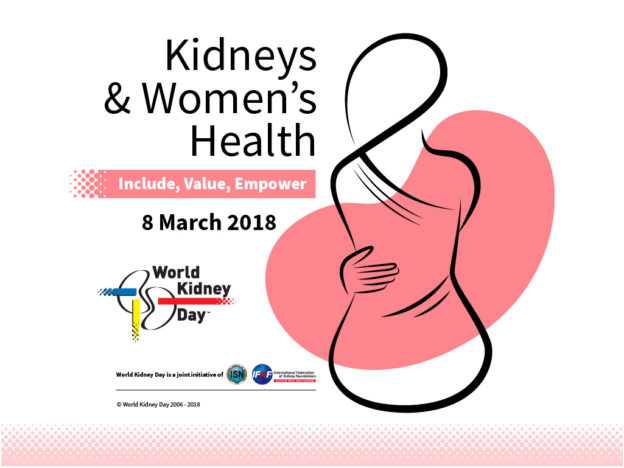March 8 2018 is World Kidney Day
This is the 13th annual observance of the second Thursday in March as World Kidney Day. The concept was initiated by the International Society of Nephrology (ISN) and the International Federation of Kidney Foundations (IFKF) to raise public awareness about kidney disease which is prevalent, harmful and treatable. This year, the day falls on International Women’s Day. It is not surprising that the theme of World Kidney Day is ‘Kidneys and Women’s Health’
Our amazing kidneys are two bean shaped organs approximately the size of our fists which are located in the back on either side of the spine just jutting down below the lower ribs. Despite their small size, they receive a very rich blood supply and are responsible for filtering our entire blood volume as many as fifty times each day! They remove waste products and toxins from the body, remove excess fluid, regulate the concentration of salts like sodium, potassium, help control the pH of the body fluids and help to regulate blood pressure. In other words, they operate as the sanitation department and the master chemists all in one. In addition to these well known filtration functions our kidneys also produce chemicals and hormones that help us make red blood cells and keep our bones healthy and strong. Our Kidneys are a vital organ which means that we cannot survive without some function from them.
Chronic Kidney Disease (CKD) is prevalent and as many as 10% of the population may have some degree of CKD. Moreover, the early stages are frequently asymptomatic so many persons are unaware of having kidney problems until they have lost as much as 90% of all kidney function. Diabetes and Hypertension, the two most common chronic diseases in Jamaica, are the leading causes of CKD. Kidney disease itself is an independent risk factor for Cardiovascular Disease namely heart attack, heart failure, stroke and peripheral vascular disease. Persons with kidney disease are also 10 times more likely to have Cardiovascular Disease that the general population. Kidney disease affects all age groups, races and socioeconomic classes but the risk increases with age.CKD progresses on a scale of stages from 1 to 5 from mild moderate to severe. Although the milder stages are common, the most severe form, Stage, ESRD or kidney failure can be delayed and sometimes prevented by early detection and appropriate treatment. This is why raising public awareness is vital, so that the most severe stages of CKD may be reduced or delayed thus decreasing the burden of treatments like dialysis and kidney transplantation on the population. The imperative of governments, health planners, physicians and patients, is to prevent or slow the progression of kidney disease, as the cost of treating kidney failure is prohibitive and the outcomes are often suboptimal.
Theme: Kidneys and Women’s Health
This year, World Kidney Day places the spotlight on women, aiming to inform, include, value and empower them. Worldwide there are more than 195 million women living with Kidney disease and more than 600,000 women die annually from it. Women have a slightly higher incidence of kidney disease than men, 14% compared to 12%. They also have some risk factors that are unique to them. These include a greater frequency of urinary tract infections, as well as conditions associated with pregnancy and childbirth, for example, Eclampsia and severe Preeclampsia. Auto immune diseases like SLE disproportionately affect women by a ratio of 10 to 1. A worrying trend is that the prevalence of CKD is rising among women and may affect up to 3% of women in their childbearing age. Moreover, pregnant women who have CKD are at an increased risk of negative health outcomes for both mother and the baby.
Despite this increased predilection, access to dialysis and transplantation appear to be unequal as more men are on these programmes than are women.
Today we encourage women to be aware of how amazing their kidneys are and how important to their health .We encourage them to observe the golden rules to preserve kidney heath.
Golden Rules
- Smoking cessation; Reduction of salt intake; 3. Maintenance of hydration; 4. Control of hypertension and diabetes which are the leading causes CKD; 5. Avoidance of obesity; 6. Exercise; 7. Adoption of a healthy diet and life style; 8. Avoidance of prolonged use of pain medications called NSAIDS which can cause kidney damage.
You are at risk of having kidney disease if you have any of the following conditions:
- Diabetes Mellitus or sugar
- Hypertension
- Eclampsia or Preeclampsia during pregnancy
- Autoimmune Disease like Lupus or SLE
- Repeated urinary tract infections or Kidney stones
- Family history of kidney disease
- Repeated tests showing blood or albumin in the urine.
- Getting older , Female >60
- Sickle Cell Anaemia
If you are at risk, please get tested for kidney disease today. Tests include a urine test for a type of protein called albumin and a blood test to measure serum creatinine. This measurement is used to calculate your GFR, which reflects the percentage of kidney function that is present.
Screening will promote early detection, timely treatment to slow the rate of progression, reduce complications and improve the quality of life of persons with CKD.
Dr. L. Johnson-Whittaker Nephrologist
CEO Sunshine Dialysis Centre Ltd

Recent Comments